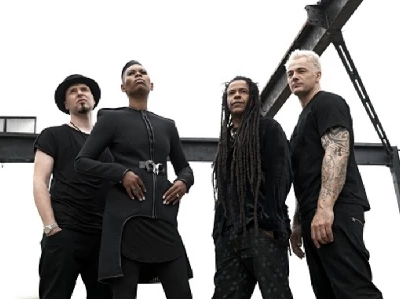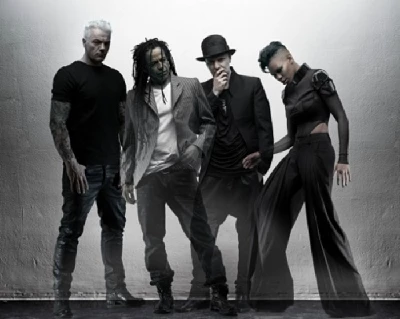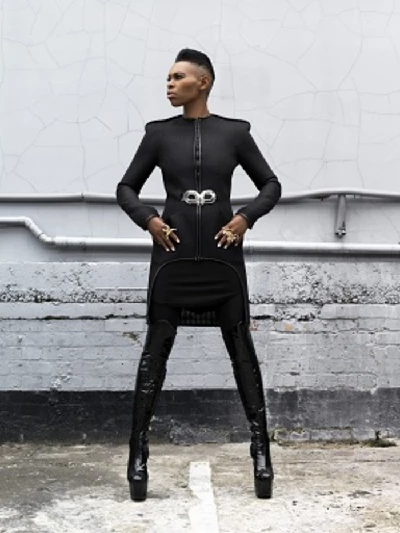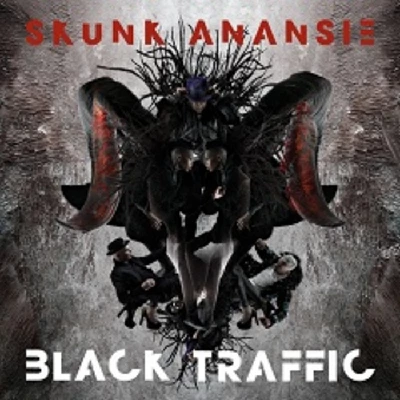published: 23 /
2 /
2013
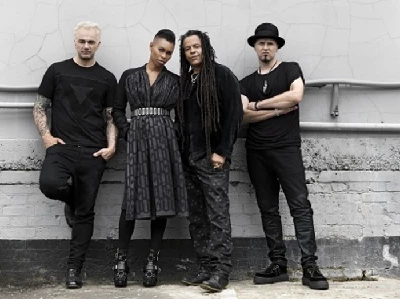
Dave Goodwin chats to Skin, the singer with London-based rock band Skunk Anansie, about her group's reformation, new tour and second comeback album, 'Black Traffic'
Article
Skin is the 6-feet tall lead singer of rock band Skunk Anansie. They formed in March 1994, disbanded in 2001 and reformed again in 2009.
In total they have spent 141 weeks on both the singles and album charts. They were voted Best New British Band in 1995 and 1996 by the readers of ‘Kerrang!’magazine, the same year that drummer Mark Richardson joined the band. In 1997 they were nominated for Best Live Act and Best Group at the MTV Europe Music Awards.
Their first two albums, ‘Paranoid and Sunburnt’ and ‘Stoosh’, were released on One Little Indian records in 1995 and 1996 respectively. They switched to Virgin in 1998, and their third album, ‘Post Orgasmic Chill’ came out in 1999.
Skin has described Skunk Anansie as a "clit-rock" group, which Allmusic clarifies as "an amalgam of heavy metal and black feminist rage." The group toured globally throughout the 1990s, with such bands as U2, Aerosmith, Feeder, Lenny Kravitz, Therapy?, Killing Joke and Muse.
After their split in 2001, Skin embarked on a solo career. Her debut solo album ‘Fleshwounds’ was released in September 2003, and followed by ‘Fake Chemical State’ in March 2006. She has also provided vocals for a number of other acts' songs. After releasing ‘Fleshwounds’, Skin went on to perform various solo gigs around Europe. She was also support for the European leg of world tours by Robbie Williams' and Placebo. Her single, ‘Tear Down These Houses’, was released as a part of the soundtrack to ‘Parlami d'Amore’, which was directed by Silvio Muccino.
In September 2010, Skunk Anansie released their fifth studio album ‘Wonderlustre’, which was their first after they reformed. They released their sixth and latest studio album, 'Black Traffic', in September 2012 via their own label Boogooyamma Records and in partnership with 100% Records.
The name "Skunk Anansie" is taken from the West African folk tales of Anansi the spider-man, with “Skunk” added to "make the name nastier".
Pennyblackmusic caught up with Skin for a chat before she sets off for another tour taking in most of Britain's major cities.
PB: Skunk Anansie was such a successful band. Why did you split in the first place?
S: Gosh, you know, it's like one of those things if you ask old couples the same thing it is like, “Don't go over old stuff! Don't rehash bad things from the past,” and I feel a bit like that. I feel like every time I talk about it I give it a bit of air, give it a bit of life.
A quick way of describing it is to say that the chemistry in the band dissipated. Although we remained friends, we were working too hard and we got tired and then it faded. We got the band back together because we had had a bit of a break, and we got the vibe back again, and it started working.
PB: You have always taken a political approach to your music, but ‘Black Traffic’ seems to say more about politics than ever before. Is this how the whole band sees it?
S: Basically we write songs as a group, but the band really do have a lot to say about my lyrics and what they think they are about. Some of the stories are about some of the things that have happened to members of the band. We're all in it together. The songs weren't written finger-pointing like, “This happened to us,” and “That happened to us.”
I was talking to my friend the other day, and they are trying to take her house off her because she had an accident. She was knocked off her bike, and she was in hospital for a month, and she didn't pay the mortgage for a couple of months, but she is getting back on track and she has got a plan, but they just want to take her house and they don't care that she's got a plan to pay all the bills in six months.
A lot of stuff like that ends up in songs, and things will just come up in conversation, and it is always something along those lines which spark the lyrics or spark the song.
PB: How do you resolve issues within the band if there are differences?
S: Heavy discussion. I think that you have to discuss things. People aren't going to agree all the time, and so you have to discuss things in a respectful way. We will discuss things and every one will put their point in. And that's how you know how you're right or wrong. If you can stand up and argue about it, then you can fight for your opinion or then you can work out whether you were wrong about that. If you've got a strong point of view, then it makes sense to talk about it.
PB: Are you all as strong as each other then?
S: Everyone's got a big mouth in my band! They're all just as domineering as each other. That is most of the time a good thing.
PB: Was it easy to get back into the studio together with each other, and did ‘Black Traffic’ begin life the same way as the other albums?
S: Strangely, it was easy-peasy. A lot of the issues that split us up, such as alcohol and drug problems, just weren't there anymore. Everyone put themselves out.
PB: And now it's all gone?
S:And now it's all gone, yeah. People damage themselves, you know? They just made themselves not as strong in the band as they would have been if they hadn't been drunk all the time. It is not that people don't drink in my band because, yes, we do, but I think they just put it into perspective now. You grow up, don't you? You can't run around being a tearaway all the time. In a band, when you're young it is a laugh, but when you're past forty it looks a bit pathetic.
PB: Did you see the other guys during the period that you were apart?
S: Yeah, it was eight years that we weren’t together, but we still saw each other all the time. Mark was in Feeder and I was working on my solo albums and we were rehearsing right next door to each other. I saw Mark a lot. And Mark saw Cass and they played on my solo albums. I used to be in a band with Cass before Skunk Anansie, so Cass is just a mate who I hang out with every now and then anyway. I didn't see so much of Ace because he had kids and, after his first kid, the mother was really sick, so he was dealing with that a while. But after he got through that I saw him a bit more.
PB: Whilst still being a proper rock album, there is some sampling and electronica in ‘Black Traffic’ too. Whose idea was that?
S: It was all of ours really. I DJ a lot and most of the electronic stuff came from me, I suppose. We approached this album in a totally different way, and not by walking into a studio and recording it live which is how we've recorded everything in the past. We've got to the point now where we are so solid as a band that we don't need to try and capture something. Every time we play we capture something, and every time we play we rock, rock, rock. We are rock solid and we play with emotion and raw passion, and that's just now intrinsically there in everything we do.
We had another band that was kind of on and off. With this band, it was all about deconstruction, and experimenting and trying to get the best vibe going by messing about, and everybody having mad ideas and seeing which one worked.
And that's what we did with the album. There is no sampling on the there apart from all the instruments we sampled ourselves and played as Skunk Anansie, and we some of our mates in to play a couple of sessions with us. I think we still keep the rock element by sampling ourselves and bringing any other alien sounds in there.
PB: You're on the road again in late March/early April, and it is pretty full on booking-wise with only the one night off in between three to four nights on.
S: Yeah that's normal.
PB: What do you do on that night you've got off then?
S: When we have a day off, we tend to have a little bit of a drink. It depends where we are because it's really nice to catch some galleries, get a bit of art and culture, and sometimes I might do a DJ gig. And, if there's a shopping place, then we'll go and get some trainers or something.
PB: Are you a big shopper (Laughs)?
S: I don't like to undermine it but, yes, I do like to shop! Everyone's got different things, you know.
PB: You are a parent. How do you juggle that with life on the road? It must be a little disruptive at times.
S: Yeah, I'm a step mum. You just have to be organised (Laughs)!
PB: You must be really organised!
S: I am very organised. That's one of the tricks I've developed over the last 10 years is that I am very organised. Actually I've always been pretty organised. I drink less so I'm pretty organised now (Laughs).
PB: How do you all decide on the set list for gigs? Is it down to you or is it a group thing?
S: It is a group thing. Basically we only play songs that we really like to play, because otherwise that drains the life out of it. Some of the songs we've recorded sound really good, but when we play them live they just don't have the same energy. Some songs also just kill it every time. There are certain songs that have stayed on our set for a long time and we always have new albums so there is always new stuff to play in there. We play some old classic stuff and also some newer stuff as well.
PB: Did you find it harder to write music by yourself in a solo capacity than with a band?
S: No not really. I'm the main one in the band that puts the songs together, and the solo stuff was much more personal I guess, much more intimate, which was actually more enjoyable to write, and just writing about things that affected me in a way. It is quite a vain thing to do really.
PB: You won an award a while back for 'Services to Italian Culture'. How did
that happen? What brought that about?
S: I have no idea! They picked me out of a hat maybe (Laughs) You know those Italians. They are so OTT.
PB: Why are you are so popular in Italy?
S: We're quite big in Holland and Germany also, and we're working really hard on France at the moment too. We have got a lot of personal contacts in Italy and we really like going there. It's quite a radical place. They've had this weird political situation for years, and the kids are up in arms. It is interesting what's going on up and down the country. There' is a kind of a north/ south divide also because it's long and skinny. I think they're very loyal, and the deal is with Italians is as long as you keep putting out decent music they'll tend to keep supporting you. That is kind of typical with a lot of European countries.
England is completely the opposite. They are very disloyal, or at least the English music industry is. The fans are really loyal, but the industry like the radio and the TV and the magazines and all those people are really disloyal. The grief that Adele gets now makes me crack up! I think, “Hold on a minute. Isn't that what you wanted for her?” We should be happy for her. She's done a fantastic album, so did Amy Winehouse and they just get booted in the gut the minute they sell a few records.
I think the English industry is disloyal, but it's not the same on the continent. The whole festival thing is really important to them, and it is rock bands they want to see at festivals. They have massive electronic festivals as well, but when you do festivals what band goes down the best? It is always the big rock band. People have got a bit of energy there. The Italians are a very passionate race, very emotional. They are quite conservative too. We tend to do quite well in those countries!
PB: It's interesting what you're saying about the English thing. We get ourselves some legitimate stars and we just end up slating them.
S: Yeah, look at Coldplay. People hate that band (Laughs). Why? Why the hatred? They're just a fucking band. What have they done to be so hated? It is just because they are so huge .Even Oasis when they got really big, they got a kicking! It's such a shame. You go to America and it's really the opposite. People love it and are really happy for them and it is cool, but in England the minute you get a bit of success you're not cool and the press don't like it much. My example there has always been Suede. I always remember how morbid they were, and they put out these great albums, and everyone just turned on them and I'm like, “What did they do?”
PB: Anton Corbijn is a legend in my eyes. I have every virtually book with every photo. You did various photo shoots with him. How did that come about? What was he like to work with? Did it start with 'Stoosh'?
S: Yeah, well, we really liked what he'd done with Depeche Mode and U2, so we asked him and he said yes! He's a big fan of the band. He's very talented. He see things that no-one else sees. I'll always remember my favourite photo he took of me was me pushing an empty shopping trolley in some dirty, old street, and dressed up in a mini skirt and high heels and a skimpy top(Laughs). Anton is very stylised, but it is a great style.
PB: Are you comfortable in front of the camera?
S: Not really! It's a necessary evil. I like photographers because I think that photographers are artists. What I hate is camera phones. I hate people taking pictures with camera phones all the time.
PB: From the crowd at gigs?
S.: No, people used to come up and get an autograph. Well, now they come up and want a fucking picture and it's so irritating! I just think that photography is a real, real art, and I think people are with things like Instagram (and I'm on Instagram) really egotistical about how good they think they are. They take a picture, and put an effect on it that someone created for them, and they think that are creating great pictures, and I think it's a bit of a shame. I have a camera phone, but I don't take that many pictures with it.
Do you know what it is? It's like people feel that it's absolutely okay to film you whatever you're doing, wherever you are. You're in a restaurant eating and someone's sneakily got a camera phone out there. I think there's got to be an etiquette that's lost now because everyone thinks that it is okay and legal and cool to film people doing their private business. I think it is a privacy issue. If I'm going to the bathroom, I don't walk into a cubicle to somebody with a camera phone. It is like, “Get it out my face!” And then if you do it to normal people in the street, they get really offended, but it is okay to do it to somebody famous.
PB: There is the argument that you are a lead singer in a successful band and that you should expect treatment like that.
S: Well, the thing is that if you're a reality star and you're being filmed all the time then you should expect that, but I'm sorry. I got into a band and wanted to be a singer. I didn't get in a band to be on tabloid press or on YouTube? I got in a band because I wanted to create music and create albums, and I'm not a reality star or on those TV shows, and I haven't been in the jungle, so I haven't changed my perspective.
If those people want to talk about their personal lives all the time, then, yes, it is open season for them, but not everybody is like that. Some people just want to be in a band and make good music. They don't want to have their life out there for everyone to see.
I think people with intelligence can see the difference. I f I wanted to be in a tabloid, then I'd go to a night club, shag a football player and get drunk every night and talk about it to ‘The Sun’. You're putting yourself out there and doing that. But I am not one of those people.
PB: Thank you.
Band Links:-
https://skunkanansie.com/
https://www.facebook.com/OfficialSkunk
https://x.com/skunkanansie
https://www.instagram.com/officialskun
Picture Gallery:-
